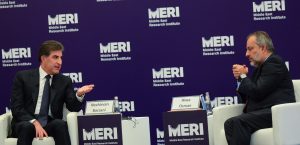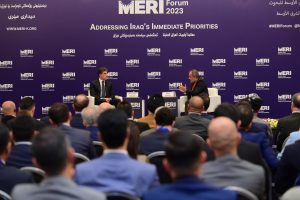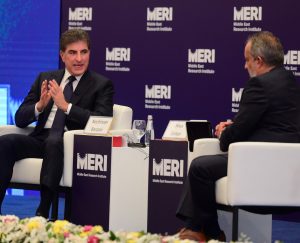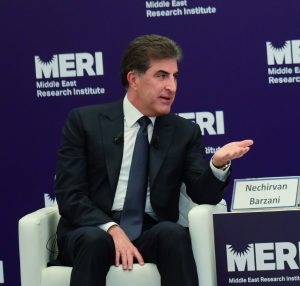Institutionalisation of Federal-Regional Relations: A Process Long Overdue
Internal Challenges
The panel moderator, Hiwa Osman, began with a question related to internal divisions within the Kurdistan Region and the continuation of both the Yellow and Green zones that people expected to disappear with times. “Now it seems that the Yellow and Green zones are yellower and greener and nobody talks about the strategic agreement anymore, or it is gone? “If you were asked for a roadmap, how would you solve it?” he asked.
- Nechirvan Barzani, President of Kurdistan Region of Iraq
- Hiwa Osman, Journalist (Moderator)
In response, the President of the Kurdistan Region of Iraq (PKRI) said:
To answer this question, we need to go back to the previous years, when the late Mam Jalal and President Barzani worked together, we were able to secure great achievements for our nation and Iraq, with the cooperation and assistance of all other Kurdish parties. The relationship between the PUK and the KDP is an important one and we must all try not to challenge it with big problems. There is often a big concern about whether the relationship between the PUK and the KDP is so bad that it might face big problems. I say, no, it’s not so bad that we can’t solve them. Coming back to the current reality, I think that the PUK is going through a period of transition in Kurdistan, especially after the late Mam Jalal and thereafter. Now we feel there is a degree of political stability within the PUK, especially after this congress. We are looking forward to a better future for the relationship between the PUK and the KDP. It is not a matter of unity, but of finding a common understanding on how to work together. I believe both the PUK and KDP have realized that they must work together.
We must agree on a joint paper, what is our collective vision for the future of this relationship? In the current phase in Kurdistan, we need to reach an agreement and a new understanding with the PUK on governing Kurdistan. We both need to be realistic and in reading the dynamics and work together.

Baghdad-Erbil relationship
The panel moderator turned highlighted that the PUK and PDK are part of the (State Administration Coalition) and the condition for joining this coalition included, among others, delivery on: the budget, oil and gas law, article (140) and Sinjar agreement. But progress has been slow, if at all. How would you describe the situation with Baghdad?
In response, the PKRI said:
In my opinion, there is a fundamental problem in the relations between Baghdad and Erbil, which must be resolved. First of all, according to the Iraqi constitution, we have a federal system. Iraq is a federal country, but in essence there is a very strong centralism [in Baghdad]. Federalism has not yet taken place in Iraq. This is not a complaint. Since 2003, we have been going through a period of transition. Until this problem is resolved with Baghdad, whether we have a federal system or a centralized system, the other problems will not be resolved. The essence of the problem is here, and let me add: For example, if we want Iraq to have political stability, if we want to have economic stability, our brothers in Baghdad must take a very serious position on this issue. There is no clear strong will on both sides to sit down at the negotiating table and resolve the issues. Regarding the federal system, we may do some things in the Kurdistan Region that are not within our rights according to the federal system, but we think that the way Baghdad engages the Kurdistan Region in some cases is everything but not federal.
What does this require? This requires us to sit down seriously. Where the Kurdistan Region has gone too far in the federal system, reduce it, and where Baghdad does not implement the federal system, to make sure they will. I believe that this is in the interest of all Iraqis. Inside Iraq, there should never be any talk about who is weak and who is strong. This is a logic that is very, very bad for Iraq. If this logic continues, nothing other than problems will be produced for Iraq.
As you mentioned, yes we are part of the State Administration Coalition. Together with our brothers, we are an essential part of creating this coalition. If your question is that nothing has been done, I think some progress has been made in the eight or nine months since the administration was formed, but we also have problems. These problems must be resolved, we have a roadmap that we all agree on.
Together we have succeeded in defeating ISIS. Together, we restructured the new Iraq, no one side did it alone. We built Iraq after 2003, and laid the foundation stones together. We are and will remain an essential part of Iraq. I have often emphasized one thing: the Kurdistan Region must understand that the strategic depth of the Kurdistan Region’s relationship is Baghdad, nowhere else, and must solve our issues with Baghdad. We defeated ISIS together. Peshmergas were martyred, both Iraqi Army and the Hashdi Shaabi fighters were martyred. They all gave their lives for this cause. What was the blood mixed for? In order to defend this country, which must make us believe that the problems that we see today can be easily solved with this spirit. Are the salaried employees of Kurdistan Regional Government not part of the Iraqi people? How does loyalty form for a country?
The KRG has dealt with Baghdad and its political forces with the utmost transparency on this issue. We expect them to defend the citizens of the Kurdistan Region and the salaried of its employees.
Iran’s Pressure
Osman then referred to Iran’s demand for the Kurdistan Region to expel the Iranian Kurdish opposition forces as political refugees. Despite assurances from Baghdad officials, Iran does not seem to have been satisfied. “Iran is making a kind of threat to the Kurdistan Region and it has done so in the past and fired 12 missiles at us in Erbil. How will we deal with Iran?
In response, President of Kurdistan said:
In principle, it is not right for Iraq to become a threat to any of our neighbors. The international law does not allow anyone to make their country a safe haven for the opposition of another country to take advantage of … and conduct military operations {in their own country} and then return. Meanwhile, Baghdad has signed a security agreement with Tehran. We in the Kurdistan Region, as part of Iraq, are committed to implementing this agreement. We are committed and what we have done so far has been in accordance with this agreement. In Baghdad, the file that is now managed by Mr. Qasim al-Aarji and in the Kurdistan Region managed by the Interior Minister, we have made great progress in this area. We reiterate the principle that the Kurdistan Region is not a source of threat to the Islamic Republic of Iran. The Islamic Republic of Iran is our important neighbor. We have a long border with the Iran and we want these issues to be resolved through dialogue. We have made good steps and as far as I know, the Islamic Republic of Iran is grateful for these steps. I can also say that thankfully they have a very good understanding of the situation in the Kurdistan Region. I have met with them and they are keen to ensure that the Kurdistan Region will not face any problems.

Exporting Kurdistan’s Oil
In response to another question about the resumption of oil exports through Turkey, the PKRI said:
Turkey has now expressed its readiness to open the pipeline and allow oil to flow. There are two major obstacles: First, according to the agreement, if oil is exported, the money goes back to Baghdad. But how are the oil companies going to be paid? According to the Iraqi budget law, the Iraqi government has set $6 for each barrel of Kurdistan oil, which is very low, because the nature of our contracts in the Kurdistan Region is not service based. It is a partnership with companies. In the rest of Iraq, they pay $30 in some places according to the circumstances. In Gayra, it is $30 per barrel, but for the Kurdistan Region it is $6. This is a big problem in itself. That is why it must be solved. The other problem is that SOMO must sign contracts with the companies that have bought Kurdistan oil so far. This will not be a problem because they are talking now, but this issue must be resolved with Baghdad in order to start exporting oil in practice. The problem is not in Turkey, the problem is in Baghdad.
Turkey and the PKK
Regarding the war between Turkey and the PKK, Osman asked whether there was a rapprochement between the PKK and the Turkish government. Is there any room for something like the past to be repeated or revived today?
In response, PKRI said:
In principle, this problem must be resolved through dialogue. This is not a problem that we can solve militarily. This is the kind of problem that must be solved politically. What I said about Iran is the same principle for Turkey. The Kurdistan Region should not become a source of security threat for neighboring countries. This this principle applies to Turkey as an important neighbour. The PKK is a big problem for the Kurdistan Region. The PKK has no respect for the institutions of the Kurdistan Region. As long as this is the PKK’s policy, we cannot guarantee that Turkey will do nothing.
I have tried a lot and we have made a lot of progress. It doesn’t mean that nothing has been done. We have done a lot of things very quietly in Turkey. If the question is whether there is an opportunity now , we want to have an opportunity to play a role in bringing about a solution, but it is not clear at the moment.
Sulaymaniyah Airport
The panel moderator asked: Have you talked to them about Sulaymaniyah Aairport? with the Turks. Why have they closed it? When will they open it?
The PKRI said:
Yes, I have discussed that with them. We are in constant dialogue to eliminate any concerns that Turkey has about this issue and to facilitate the arrival of Turkish and other countries’ planes to Sulaymaniyah. We are constantly on the line with them. Some have concerns that need to be addressed in order to move forward.

Relations with the United States
Regarding the United States, Osman said that the United States is an important ally here, and in Rojava is an ally of Syrian Democratic Forces (SDF). “You have fought together on both sides, but what we are seeing now is that their alliance with SDF is being bombed every day in front of the people and the United States,” he said. The United States is watching them. If something like this happens here, although it happens in some places, what do you expect from the United States? How far does your relationship with the United States go?
“Since 1991, the United States has been a major part of [the coalition for] protecting the Kurdistan Region, which created the no-fly zone. This could not have been done achieved without the United States. The US, Britain, France and other allies, were the main supporters of the Kurdistan Region at that time. If the United States and other European allies had not helped the Kurdistan Region and Iraq in the fight against ISIS, it would not have been clear what the situation would have been like.
We look with gratitude at the role of the United States and its allies in Europe, the allies who have really helped us. We still see the Kurdistan Region as part of Iraq. There is a Strategic Agreement between the United States and Iraq. There is a lot of scope for the Kurdistan Region to use the framework of this Strategic Agreement, and to play a role. The United States has always wanted to encourage both sides [Baghdad and Erbil] to resolve issues, both domestically and in the Kurdistan Region, and continues to encourage us to engage in dialogue and resolve issues with Baghdad. Nothing has changed in this regard. What is seen is that the United States is sometimes slow in responding. I think it is to do with being busy, they have a lot of priorities. Now there’s the Ukraine issue, the China issue, there are other very big issues that are keep the Americans busy. Otherwise, we will not see a major change in US policy towards the Kurdistan Region and Iraq.
“There are many things that they are asking you to do”, said Hiwa Osmal.
The PKRI said:
I think their complaints about the Peshmerga forces are very right and very legitimate. What is the problem with what the US and allies like Germany and France want? They want the Peshmerga to be united. They complain that the PUK and KDP are not taking enough steps to address this issue. The complaints are valid. Of course, this does not mean that nothing has progressed, some steps have been taken, but the steps are small, slow and they want this process to be done better and faster. We have mad progress, but have not reached those steps wanted by our friends, our allies who support this process.

The Federal-Regional Relationship
Hiwa Osman spoke about the understanding between Erbil and Baghdad, and their federal relationship. “Where in Baghdad should this discussion be held, in the courts, in the council of ministers, in the Parliament or with the [State Administration] Coalition?”
The PKRI said:
I think we should have a serious dialogue with our allies, those with whom we have formed the government. In other words, a serious mechanism must be established with our allies in the State Administration. Baghdad’s financial interaction with the Kurdistan Region is unlike any other federalism in the world. We went to Baghdad in 2003 with these promises. Since we participated in the formation of the new Iraq, not much has changed politically in the Kurdistan Region. Before 2003, we had the same situation that we have now.
The biggest question is whether the Kurdistan Region is part of Iraq or not. Are we Iraqi citizens or not? We consider ourselves Iraqi citizens and we consider the progress of any part of Iraq as our own progress. We will be happy to see progress in Basra and we will be happy to see it in Anbar. The same must be true in Iraq. The progress of the Kurdistan Region is progress for the whole of Iraq. It is not clear what system of governance we have in Iraq now. If we can solve this, the budget will be solved, the salary problem will be solved, because we will reach a common understanding for running the country. This is the biggest priority. When I went to Germany, the Prime Minister asked how we could help you. My answer was that you have a very orderly federal system, and Ambassador Luqman Faily was present. Help us implement the federal system in Iraq.
In response to questions from the audience, the PKRI made the following statements:
US treatment of the Kurdistan Region: In terms of support, the United States does not distinguish between Iraq and the Kurdistan Region. The United States emphasizes the integrity of Iraqi territory and a strong Region within Iraq that can help itself and Iraq. I don’t see anything changing in US policy, but we don’t need outsiders to solve problems. We may need technical help, but what is important is that we have to solve our problems ourselves. As one household, let us sit at the negotiating table for we have a common future. Before we ask the United States, we must sit down and ask the United States or any other party to support us if necessary.
The war between Hamas and Israel and the preparations in the Kurdistan Region: We as a nation and as Iraq, no one knows as much as we do what the misery of war means. The Palestinian people have the right to have their own state. If you look at the region, you see that they have the right to have a state and live in peace in the region. Today’s blockade on Gaza, a place of 2.3 million people, is heading towards a humanitarian disaster and we hope this war will end soon.
MERI Forum 2023
Addressing Iraq’s Immediate Priorities
10 & 11 October, 2023
Session 6: Institutionalisation of Federal-Regional Relations: A Process Long Overdue
Session Video

